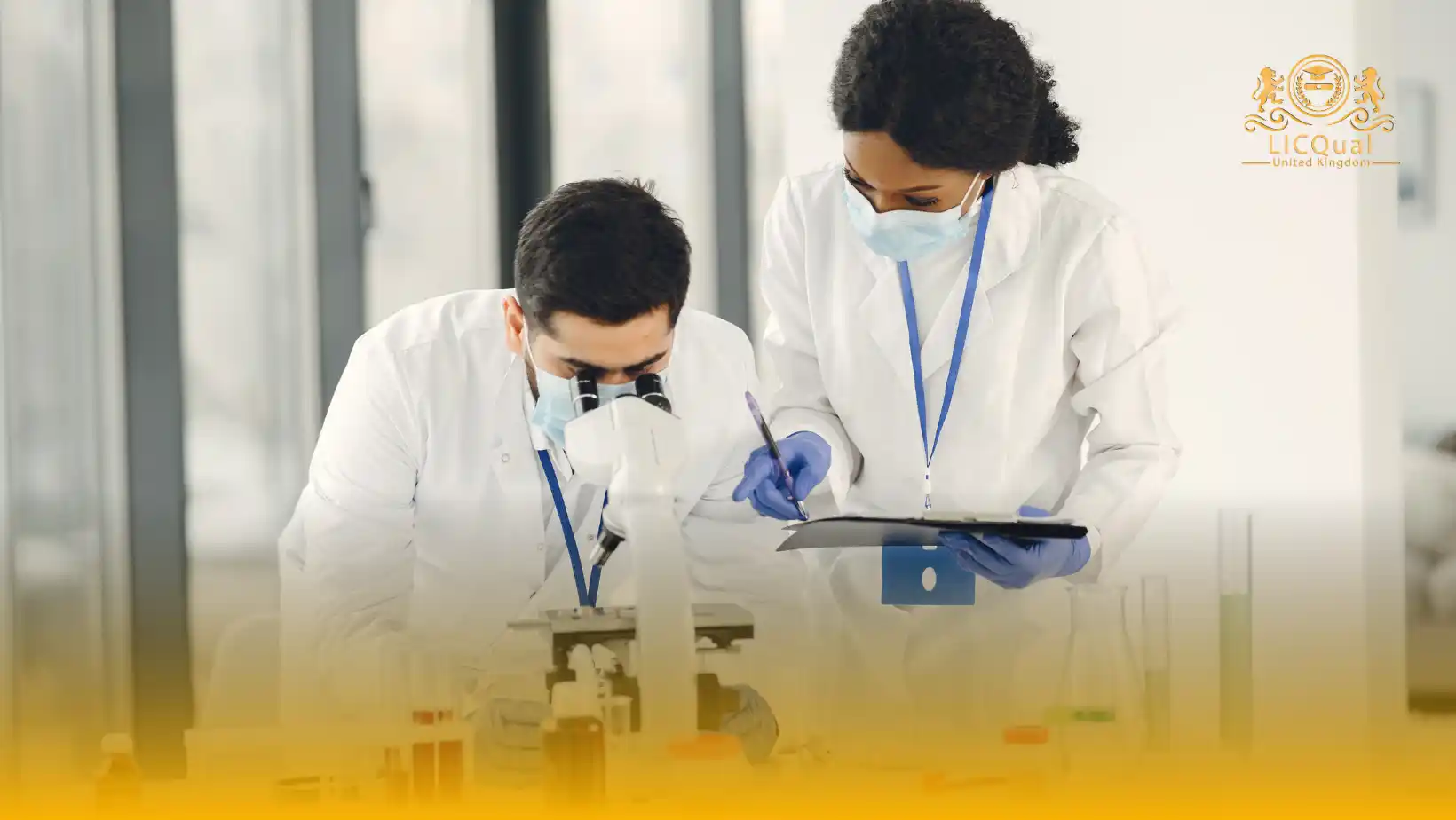The LICQual Level 3 Diploma in Nutritional Biochemistry (Dip Nutritional Biochemistry) is a specialised qualification designed for learners seeking in-depth understanding of the biochemical processes underlying human nutrition. This diploma equips learners with the scientific knowledge and practical skills necessary to analyse nutrient metabolism, biochemical pathways, and the molecular mechanisms that influence health, wellbeing, and disease prevention.
Ideal for healthcare professionals, nutritionists, dietitians, wellness practitioners, and researchers, this qualification enables learners to enhance their professional expertise, expand career prospects, and engage in Continuing Professional Development (CPD). Learners develop the ability to interpret biochemical data, evaluate nutritional interventions, and apply evidence-based principles to optimise health outcomes.
LICQual ensures that centres delivering this diploma maintain the highest standards of teaching and training. Centres must employ competent and qualified staff and provide access to up-to-date learning materials, laboratory facilities, and practical resources necessary for a high-quality educational experience. This guarantees that learners benefit from a programme that integrates scientific theory with practical application in clinical, laboratory, and wellness contexts.
Upon completion, learners achieve a recognised qualification that strengthens professional credibility and equips them with the skills to deliver scientifically-informed nutritional advice and interventions. The programme is structured to provide a balanced combination of theoretical knowledge and hands-on practice, empowering learners to apply biochemical insights effectively in professional settings and promote optimal health outcomes.
Course Overview
Qualification Title
LICQual Level 3 Diploma in Nutritional Biochemistry (Dip Nutritional Biochemistry)
Total Units
6
Total Credits
60
GLH
240
Qualification #
LICQ2201045
Qualification Specification
To enroll in the LICQual Level 3 Diploma in Nutritional Counseling (Dip Nutritional Counseling) , applicants must meet the following criteria:
|
Qualification# |
Unit Title |
Credits |
GLH |
|---|---|---|---|
|
LICQ2201045-1 |
Fundamentals of Biochemistry |
10 |
40 |
|
LICQ2201045-2 |
Macronutrients and Metabolism |
10 |
40 |
|
LICQ2201045-3 |
Micronutrients and Molecular Function |
10 |
40 |
|
LICQ2201045-4 |
Biochemical Assessment and Analysis |
10 |
40 |
|
LICQ2201045-5 |
Research Methods and Evidence-Based Practice in Nutritional Biochemistry |
10 |
40 |
|
LICQ2201045-6 |
Practical Applications of Nutritional Biochemistry |
10 |
40 |
By the end of this course, learners will be able to:
Unit 1: Fundamentals of Biochemistry
By the end of this unit, the learner will be able to:
- Explain the structure and function of macromolecules in human physiology
- Analyse enzyme function and its role in metabolic pathways
- Describe key biochemical processes relevant to human nutrition
- Apply foundational biochemistry knowledge to understand nutrient interactions
Unit 2: Macronutrients and Metabolism
By the end of this unit, the learner will be able to:
- Explain the digestion, absorption, and metabolism of carbohydrates, proteins, and fats
- Analyse the role of macronutrients in energy production and overall health
- Evaluate the impact of dietary intake on metabolic pathways and disease risk
- Apply macronutrient knowledge to support nutritional planning and interventions
Unit 3: Micronutrients and Molecular Function
By the end of this unit, the learner will be able to:
- Explain the biochemical roles of vitamins and minerals in human health
- Analyse metabolic pathways influenced by micronutrients
- Identify the consequences of deficiencies or excesses on physiological function
- Apply micronutrient knowledge to support dietary assessment and intervention strategies
Unit 4: Biochemical Assessment and Analysis
By the end of this unit, the learner will be able to:
- Conduct biochemical assessments using laboratory tests and molecular markers
- Interpret biochemical data to assess nutritional status
- Identify clinical and dietary implications of biochemical findings
- Apply assessment results to inform personalised nutrition plans
Unit 5: Research Methods and Evidence-Based Practice in Nutritional Biochemistry
By the end of this unit, the learner will be able to:
- Explain research methodologies relevant to nutritional biochemistry
- Collect, analyse, and interpret data from scientific studies and clinical practice
- Critically evaluate evidence to inform nutrition recommendations
- Apply research findings to improve clinical and dietary interventions
Unit 6: Practical Applications of Nutritional Biochemistry
By the end of this unit, the learner will be able to:
- Apply biochemical knowledge to real-world nutrition scenarios
- Develop evidence-based dietary plans and interventions
- Monitor and evaluate the effectiveness of nutritional strategies
- Demonstrate professional and ethical practice in biochemical nutrition applications
The LICQual Level 3 Diploma in Nutritional Biochemistry is designed for learners who want to understand the science behind nutrition at a biochemical level. This accredited Nutritional Biochemistry diploma is ideal for healthcare professionals, aspiring nutritionists, fitness trainers, educators, and anyone passionate about personalized nutrition and wellness. With flexible online study and international recognition, the Diploma in Nutritional Biochemistry online provides a clear pathway to career growth and credibility in the health and wellness industry.
1. Healthcare Professionals
- Doctors, nurses, and allied health workers seeking advanced knowledge in Nutritional Biochemistry
- Professionals aiming to integrate biochemical nutrition insights into patient care plans
- Those looking for an accredited Nutritional Biochemistry diploma for career advancement
- Practitioners wanting to meet international healthcare standards with recognized certification
- Individuals committed to evidence‑based nutritional guidance
2. Aspiring Nutritionists and Biochemistry Specialists
- Students eager to begin a career in Nutritional Biochemistry
- Learners seeking Level 3 Nutritional Biochemistry training with accreditation
- Those wanting a professional Nutritional Biochemistry qualification respected worldwide
- Individuals motivated to help clients achieve better health through biochemical nutrition
- People looking for flexible online study options with certification
3. Fitness and Wellness Coaches
- Personal trainers aiming to add biochemical nutrition expertise to their services
- Wellness coaches seeking a diploma in Nutritional Biochemistry online
- Professionals wanting to provide holistic health solutions to clients
- Those interested in combining fitness training with nutrient metabolism knowledge
- Coaches looking to boost credibility with international accreditation
4. Educators and Community Leaders
- Teachers and mentors promoting health education in schools or communities
- Leaders delivering workshops on nutrition and biochemistry
- Individuals wanting a Nutritional Biochemistry certification program to support outreach
- Those aiming to inspire healthier choices among youth and families
- Educators seeking accredited qualifications to strengthen authority
5. Career Changers
- Professionals from non‑health fields seeking a new career in nutrition science
- Individuals motivated to enter the wellness industry with recognized certification
- Those looking for affordable online diplomas in Nutritional Biochemistry
- Learners seeking flexible study options while working full‑time
- People wanting to align their career with personal passion for health and biochemistry
6. International Students
- Learners seeking globally recognized Nutritional Biochemistry qualifications
- Students aiming to meet international accreditation standards through LICQual
- Those wanting to study Nutritional Biochemistry online from anywhere in the world
- Individuals looking for career opportunities across healthcare and wellness industries
- Students motivated to gain expertise respected by employers worldwide
7. Community Health Advocates
- Volunteers and NGO workers promoting public health initiatives
- Individuals aiming to counsel communities on nutrition and biochemistry
- Those seeking a professional Nutritional Biochemistry qualification to support outreach programs
- Advocates wanting to combine practical skills with accredited certification
- People committed to making a positive impact through nutritional education
To deliver the LICQual Level 3 Diploma in Nutritional Biochemistry effectively, centres must meet the following requirements:
- Qualified and Competent Staff: All teaching and assessment personnel must hold relevant qualifications and demonstrate expertise in nutritional biochemistry, healthcare, dietetics, or related scientific fields.
- Access to Learning Resources: Centres must provide learners with up-to-date textbooks, digital learning materials, scientific journals, laboratory manuals, and practical tools to support effective study and research.
- Facilities for Practical Learning: Centres should have appropriate laboratory, clinical, or simulation facilities to allow learners to apply biochemical principles in practical scenarios safely and effectively.
- Assessment and Monitoring Systems: Centres must implement structured assessment procedures, track learner progress, and provide timely, constructive feedback in line with LICQual standards.
- Health and Safety Compliance: Learning environments must adhere to local health and safety regulations to ensure the safety of learners during practical and laboratory activities.
- Quality Assurance Processes: Centres must maintain robust quality assurance mechanisms to ensure high standards of teaching, learning, and assessment.
- Learner Support: Centres should provide guidance, mentorship, and access to additional resources to support learner success, engagement, and professional development.
These requirements ensure learners receive high-quality, internationally-standardised training, equipping them with the knowledge and practical skills needed to deliver scientifically-informed nutritional guidance and interventions in clinical, laboratory, and wellness settings.
Assessment and Verification
All units within this qualification are subject to internal assessment by the approved centre and external verification by LICQual. The qualification follows a criterion-referenced assessment approach, ensuring that learners meet all specified learning outcomes.
To achieve a ‘Pass’ in any unit, learners must provide valid, sufficient, and authentic evidence demonstrating their attainment of all learning outcomes and compliance with the prescribed assessment criteria. The Assessor is responsible for evaluating the evidence and determining whether the learner has successfully met the required standards.
Assessors must maintain a clear and comprehensive audit trail, documenting the basis for their assessment decisions to ensure transparency, consistency, and compliance with quality assurance requirements.







